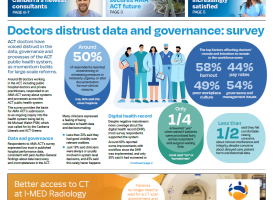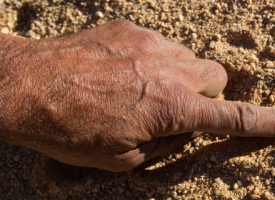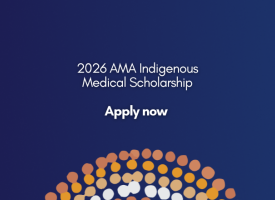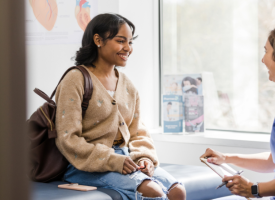Remarks by Lloyd Diggins recipient of the AMA Indigenous Medical Scholarship 2020
I'm Lloyd Diggins, I'm a Wongi man, but I grew up on Whadjuk Noongar country and Wardandi Noongar countries. I'd just like to start by paying my respects to Whadjuk elders, whose land we meet on today. Those elders hold sacred wisdom and knowledge that leads us and is led Noongar people for the last 60,000 years on this country.
So I'm humbled to have been selected to receive this award, Dr Khorshid spoke very kind words about me explaining who I am and has briefly touched on that example where the patient encountered so much casual, systemic indirect racism that she didn't feel safe in a tertiary hospital. That patient had a splenic laceration, as Dr Khorshid said, and would have been made homeless if she left the hospital against medical advice. I was recently told by a non-Aboriginal paediatrician that she didn't believe that racism still existed in health care in 2020.
Racism in health care almost killed that patient. That patient and my interaction with her gained a lot of attention. But what didn't gain any attention on that Christmas and Boxing Day shift that I spent with her was the racism against the other three Aboriginal patients on that ward. That is just- that example is only one of many things that happens in hospitals constantly. Racism and- racism in health care is as strong as ever. And non-Aboriginal people can, unfortunately, be blind to it. For that reason, I'm so grateful for the AMA for celebrating Aboriginal people and for valuing the importance of an Aboriginal workforce.
Our presence not only provides safety for Aboriginal people but makes casual racism much more uncomfortable for casual racists. So to achieve the AMA's goal of having Aboriginal doctors representing more than three per cent of the medical workforce, we need to demand a culture within health care that doesn't tolerate casual racism, so that future Aboriginal staff feel safe and supported.
We need to increase early learning opportunities so that our young people have the ability to access tertiary qualifications. And we need to celebrate First Nations people and give us the chance to recognise our strengths so that we have the confidence to take back control of Aboriginal health and out of the hands of non-Aboriginal people. I'd like to thank you again for the award and yeah, for everyone coming today. Thank you.
QUESTION: Lloyd, congratulations, you spoke really well just before. Just wanted to gain an insight about how important this is to you, and what you'd like to do going forward in the medical profession?
LLOYD DIGGINS: So, I guess, Dr Khorshid kind of touched on it, but so I have been a physio for a while, and I worked remotely in the remote part of Northern Territory called Arnhem Land. And out there, the Aboriginal population is 94% of people. So, it's almost exclusively Aboriginal health. The thing I became frustrated with was that, it's not an area that many doctors want to work in, so the kind of- the quality of doctors that were working up there was quite low. And I think their interest in cultural safeness, and learning about the local people was also lacking. And working up there as a physio I thought there's more that I could offer, that would make people want to see the Doctor and not come into the Emergency Department and then see who's working and leave because they don't feel safe there. So, that motivated me to enter medicine.
Since I've started, I've noticed that the- I think I've maybe been exposed to more areas of medicine than I had expected. So through that, I think I now want to do rural GP training, which would allow me to work in remote areas, but also some specialty training in palliative care and renal replacement therapy or dialysis, which you can do with ACRAM and their training program.
QUESTION: And have you always wanted to be a doctor since you were little?
LLOYD DIGGINS: No.
QUESTION: How did you get into it?
LLOYD DIGGINS: So from a family who hadn't- no one had finished high school, I wasn't going to finish high school. I had a high school teacher who encouraged me to finish and to then go on for tertiary education, which I think if you're from a family where this sort of context is foreign, it doesn't- it's not even an option you consider until someone like that gives you the confidence to do it, I think. So yeah, it went from that into physio, just because of I'm not sure- I was recommended to do it by a friend from school who was doing it. And then I realised in it that I could make a difference for people, generally. I think physio can be- I'm not sure if many Aboriginal people who would access physios, because I think it's quite a luxury profession for a lot of people. But I was surprised- so I was surprised when I was working how many Aboriginal people I was seeing. And yeah, I guess through that have been gone- worked in physio and then ended up doing what I've done.
QUESTION: And just lastly. Obviously, recognising that there is change that needs to happen in terms of racism in the profession. But how special is it for you that you can recognise that you can start to make that change?
LLOYD DIGGINS: I think it's great to be able to see that I can help in some way, but the problem is so massive that it can feel like calling out racism or making sure an individual feels better after having a racist experience. I can only do- I can only offer that. I can't- it's frustrating, and I think that's why there needs to be a cultural change. That it's not on individual Aboriginal people to call it out, but that it just doesn't exist. Or more empowered people are the ones calling it out and making sure it doesn't continue in the future.
QUESTION: Well said. Thank you.
LLOYD DIGGINS: Thank you.
OMAR KHORSHID: Well done. Well done. The AMA is certainly interested in doing what it can over the next couple of years in improving cultural safety in hospitals and calling out systemic racism, something that we've been talking to Ken Wyatt about already, and are looking to see what we can do practically to help in that area.
QUESTION: Is there anything in place or anything that works in terms of programmes or anything to help with that?
OMAR KHORSHID: Most state governments have cultural safety programs in place, but they're not terribly effective at this stage. And the, you know, mandatory online learning, it doesn't- you don't create cultural change by doing that. So we're hoping to look at ways to do things differently, to really engage doctors, to get them to understand the actual issues and to understand what they're doing it's not right, and then hopefully lead that cultural change.
QUESTION: Just on COVID. Premier says he's not going to South Australia for the first in-person Cabinet meeting. What do you make of that? The South Australian Premier says they have less active cases than WA to pass the pub test. What do you make of it?
OMAR KHORSHID: Mr McGowan needs to make his own decisions, but I think we're all pretty confident that every state and territory is now safe when it comes to COVID in terms of community transmission. And I think Mr McGowan would be safe. But on the flip side, we also need to be aware that hotel quarantine has an awful lot of people coming in with COVID, and that risk of COVID is actually going to be present in every state and territory for the foreseeable future, and that needs to be recognised.
QUESTION: Do you think he should be going tomorrow to the Cabinet meeting?
OMAR KHORSHID: We've all learnt that you can contribute to discussions in different ways. And while it is nice to go and meet people, I'm sure the Premier will represent WA's interests appropriately over electronic means.
QUESTION: What have you made of the border reopenings in the last week? Are you comfortable from a health position that it's all going well and the right things are in place?
OMAR KHORSHID: The borders opening is safe. The AMA is confident that the border openings are safe. What we're not so confident about is the level of complacency in the community. Having travelled to Canberra actually a couple of weeks ago, it was very clear the difference between how we are acting here in Western Australia compared with the COVID safe activities that are going on in other states and territories. So we do need to remember that risk. All those things are in place, such as the Safe WA App are actually really important steps to preparing us for a potential outbreak in the future.
QUESTION: It's the second weekend for the Safe WA Safe App [sic]. Are you confident there's going to be no bugs of it all? Are you worried it might crash again this weekend?
OMAR KHORSHID: Look, I don't know much about the technology that underpins this app, but there is the backup, of course, of writing your name and your contact details on a register. So I think it's a pretty, pretty robust process. And it's really important that all Western Australians do the right thing, use the QR code, or write their name and address, their real name and address onto the register so that in the event that something does sneak out of hotel quarantine, that our authorities are best placed to jump on top of this outbreak.
QUESTION: Thank you.



